Containerize Your Applications: 10 Best Docker Courses for 2024
The best courses to learn Docker, a revolutionary containerization platform used by developers to ensure consistent application performance across environments.
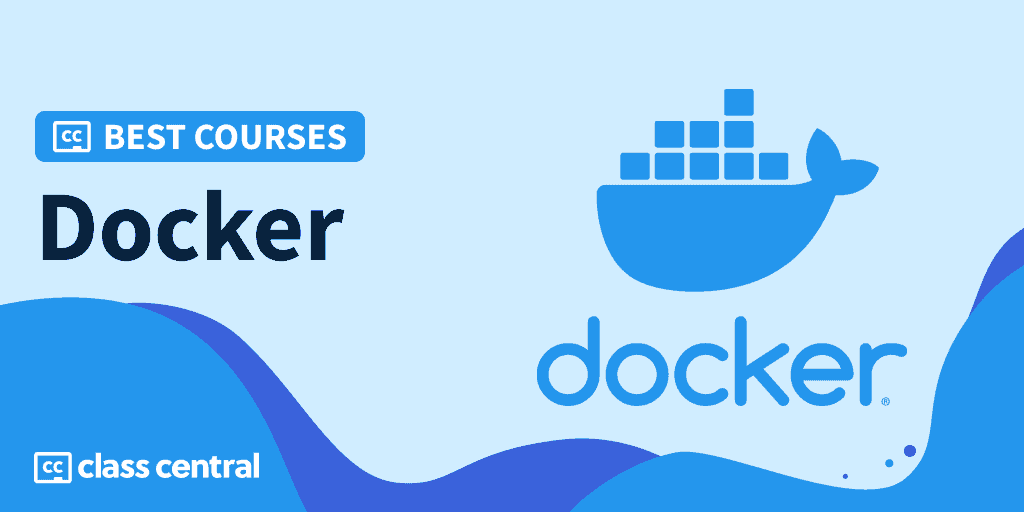
“It works on my machine!” “I just can’t seem to reproduce this bug in my environment!” “Ugh, do I really have to boot up a VM just to test this one Linux app?” “Ok, so we’ve finally deployed it to production. Now, how in the world do we scale this up?”
These complaints are all too common among developers, system administrators, and IT professionals. The struggle to maintain consistency across different environments, from development to testing to production, can be a real headache.
Enter Docker, the game-changing containerization platform used by more than half of professional developers. With Docker, you can package your applications and all their dependencies into a single container, ensuring that they run the same way, every time, everywhere.
But where do you start with Docker? How do you take advantage of this powerful tool to streamline your workflow and make your life easier? That’s where this Best Courses Guide comes in. I’ve scoured the web to find the 10 best Docker courses for 2023, suitable for fledgling software developers to experienced operations managers.
So, grab a cup of coffee, settle in, and let’s dive into the world of Docker. Your future self will thank you!
Click on one to skip to the course details:
| Course Highlight | Workload |
| Best Hands-On Course for Beginners with Free Certificate (KodeKloud) | 4 hours |
| Best Free University-Level Course for Beginners (University of Helsinki) | 75 hours |
| Best Free Docker Course For Beginners (TechWorld with Nana) | 3 hours |
| Best Lab-based Course for Beginners with Free Certificate (IBM) | 3 hours |
| Best Free Hands-On Tutorial for IT Pros and Developers (Play with Docker) | N/A |
| Best Concise Paid Course for Developers and Operations (Pluralsight) | 1–2 hours |
| Best Free Comprehensive Course to Get Production-Ready for All Levels (Elton Stoneman) | 20–21 hours |
| Best Free Workshop-Like Tutorial for Beginners (Prakhar Srivastav) | N/A |
| Best Paid Course for Beginners (Mosh Hamedani) | 5 hours |
| Best Paid Course for Developers (Nick Janetakis) | 5 hours |
What is Docker?
Docker is a platform used to develop, ship, and run applications inside lightweight, stand-alone containers. Introduced by Solomon Hykes at PyCon 2013, it quickly gained traction among developers after being open-sourced as a tool for automating the deployment of applications in lightweight containers.
How does it do this? Docker packages all necessary components into a container, ensuring code runs consistently across platforms. This lets developers focus on coding without system concerns, giving Docker its “build once, run anywhere” appeal.
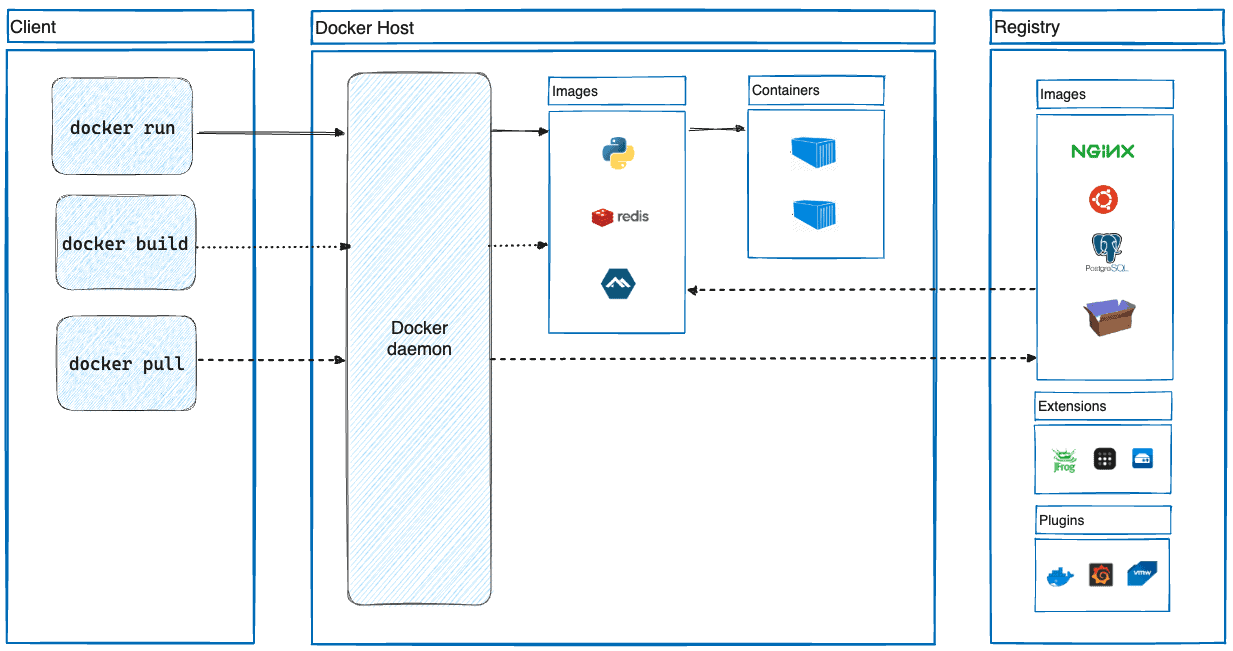
But wait, there’s more! Developers aren’t the only winners here. Docker has been a boon for DevOps teams as well, bridging the gap between development and operations with its consistent environments. Say goodbye to the exasperating “But it works on my machine!” complaints you hear in the workplace. With Docker’s containerization, you get speedier, more trustworthy deployments, increased security, and easy management. The collaboration between development and operations has never been smoother.
And all of these reasons explain why Docker has surged in popularity. According to the StackOverflow 2023 Developers survey, it’s leading the pack with 53% of developers using it, surpassing the tools of some of the most popular languages like JavaScript with npm and Python with pip. Thus, whether you’re eyeing that next big software development gig or tinkering with apps for your home server, Docker isn’t just handy; it’s essential.
Docker vs Kubernetes
Docker has become an integral part of modern software development, particularly in scenarios that require scalability and high availability. In fact, there’s a popular tool called Kubernetes that goes one step further and automates the deployment, scaling, and management of containerized applications. Thus while Docker focuses on the creation, deployment, and running of containers, Kubernetes takes on the task of managing a cluster of containers. If you want to learn more about Kubernetes, check out my Best Courses Guide on it.
BCG Stats
- All except for two courses in this guide can be taken on any platform (that Docker can be installed on).
- All courses except for one are beginner-friendly.
- Seven of the courses in this guide are free or have free certification, while the rest are paid.
- Around 3.2K people are following Docker courses on Class Central.
Best Hands-On Course for Beginners with Free Certificate (KodeKloud)
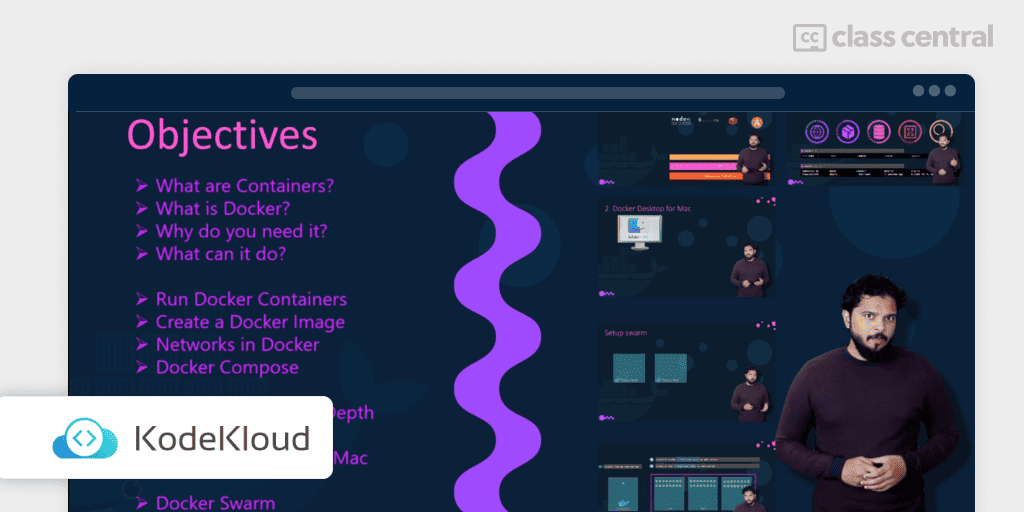
If you want a free and easy hands-on lab learning experience, KodeKloud’s course Docker Training Course for the Absolute Beginner is for you!
In this informative yet concise course, Mumshad takes you on a journey through the world of containers. You’ll learn what they are, how to run one, how it works under the hood, and finally get a basic introduction to how multiple containers can be coordinated. By the end of this course, you’ll know enough to work comfortably with containers, plus a free certificate to show off your new-found knowledge.
Each lesson is followed by a lab to help you practice and retain the Docker commands you’ve learned, and in fact I’ve found them to be quite fun and challenging. And the best part of all is that all of this is done in your browser — no set up required.
This course is the second course in the Docker Training Learning Path, with DevOps Pre-Requisite Course (paid) before it. If you enjoy this course and want more, try taking the learning path.
| Institution | KodeKloud |
| Instructor | Mumshad Mannambeth |
| Level | Beginner |
| Workload | 4 hours |
| Enrollments | 1M |
| Rating (of KodeKloud) | 4.8/5.0 |
| Cost | Free |
| Exercises | Available |
| Certificate | Free |
Best Free University-Level Course for Beginners (University of Helsinki)
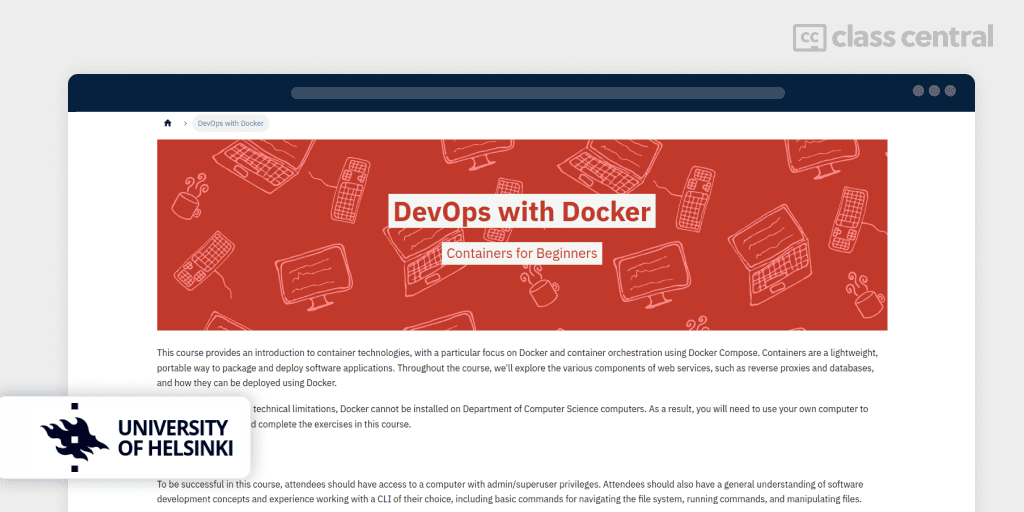
Do you want a comprehensive but not too technical introduction to Docker? Want to be confident in your containerization and configurations in the workplace? You can’t get any better than Helsinki’s free course, DevOps with Docker.
Made in partnership with Eficode, the leading DevOps company in Europe, Helsinki provides an introduction to container technologies, with a particular focus on Docker and container orchestration using Docker Compose. Throughout the course, you’ll explore the various components of web services, such as reverse proxies (nginx) and databases (MongoDB), and how they can be deployed using Docker. All you need to take this course is a basic understanding of software development concepts and the command line.
The course is mainly text-based, with a focus on exercises that you’ll complete on your local machine, though you’ll have to find the solutions online. There’s also an active Discord server if you need to discuss anything about the course.
The course is divided into three parts, and you can see what you’ll learn from each of them below:
Part 1: DevOps with Docker
- Understand the fundamental concepts of Docker, including images and containers.
- Learn how to build Docker images for existing projects and run them.
- Understand how Docker can simplify the development process.
Part 2: DevOps with Docker: docker-compose
- Learn how to manage complex multi-container applications with Docker Compose.
- Understand the role of Docker Compose in container orchestration
- Practice deploying and managing real-world applications using Docker Compose.
Part 3: DevOps with Docker: security and optimization
- Learn how to optimize Docker images for production, including reducing image size and improving security.
- Understand the limitations of using Docker Compose in production environments and the need for more advanced orchestration tools.
- Explore alternative container orchestration solutions, including Kubernetes.
Unfortunately, you cannot earn a certificate at this moment. However, the MOOC will be open for enrollment as an Open University student for free on 11/3/2024, so be sure to mark it on your calendar if you want a university-issued certificate from this course!
After finishing this course, you’ll be ready to tackle the next course, DevOps with Kubernetes.
| Institution | University of Helsinki |
| Level | Beginner |
| Workload (by ECTS) | Up to 75 hours |
| Cost | Free |
| Exercises | Available |
| Certificate | None (but free after 11/3/2024) |
Best Free Docker Course For Beginners (TechWorld with Nana)
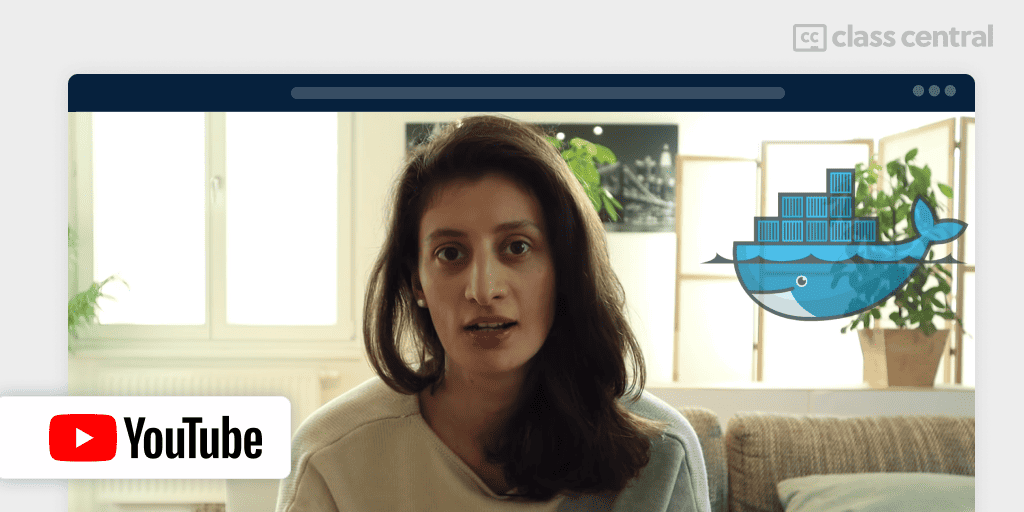
Do you prefer to learn from a YouTube tutorial? Then this is the best YouTube tutorial I could find!
Docker Tutorial for Beginners provides a comprehensive introduction to Docker, from setting up a development environment to deploying applications and ensuring data persistence. Nana understands the value of hands-on learning, and thus beginners will have the opportunity to see how Dockers fit into a complete workflow with a demo project.
What will you do in the demo project? You’ll develop locally with containers as well as deploy containerized applications to the cloud. Not only that, you’ll also figure out how to run multiple containers or services (known as container orchestration) with Docker Compose, as well as a lot of other more advanced topics.
With a mix of animated theoretical explanations and hands-on demos, by the end of the course you’ll gain a deep understanding of containerization, but more importantly how to apply it in a production setting.
| Channel | TechWorld with Nana |
| Provider | YouTube |
| Instructor | Nana Janashia |
| Level | Beginner |
| Workload | 3 hours |
| Views | 4.2M |
| Likes | 77K |
| Cost | Free |
| Exercises | None |
| Certificate | None |
Best Lab-Based Course for Beginners with Free Certificate (IBM)
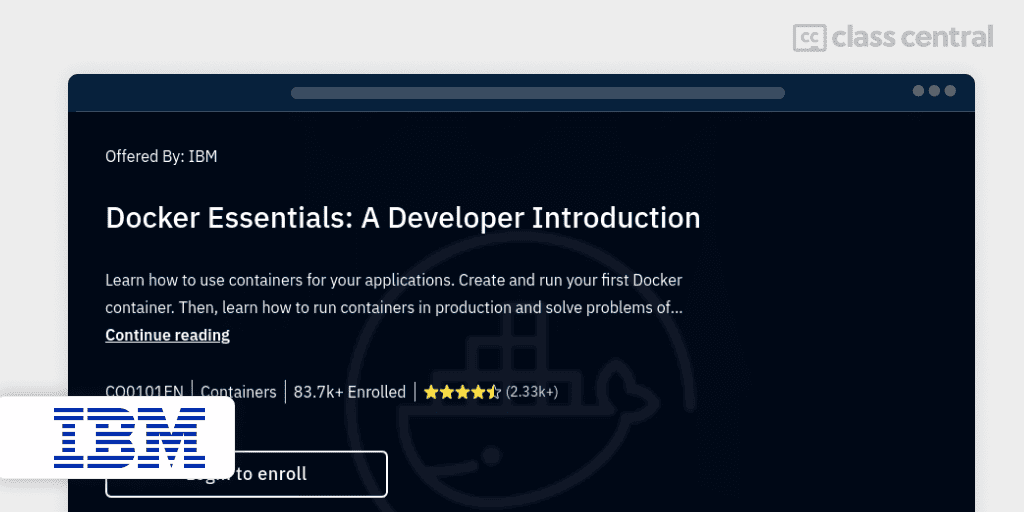
Docker Essentials: A Developer Introduction from IBM is a series of hands-on labs that demonstrate how to use containers for your applications. You’ll start with the basics: creating and running your first Docker containers. By the end of the course, you’ll get a brief introduction to running containers in production and how to solve problems of advanced orchestration such as high availability, service discovery, and reconciliation.
What makes this course different from KodeKloud’s course is that it is much more lab-oriented. Thus if you prefer less watching videos and more doing things yourself, this course is better. However, this course does assume command-line knowledge, so absolute beginners should look elsewhere.
The course provides two options to do the labs, either install Docker on your own machine or use it online with Play With Docker.
Upon achieving a passing grade of 80% or higher in the quizzes as well as the final exam, you’ll be eligible to get a free certificate. You can also get a badge, but from what I’ve read in the course discussion page, it seems it is bugged.
| Institution | IBM |
| Provider | Cognitive Class |
| Instructor | John Zaccone |
| Level | Beginner |
| Workload | 3 hours |
| Enrollments | 84K |
| Rating | 4.5 / 5.0 (2.3K) |
| Cost | Free |
| Exercises | Labs |
| Certificate | Free |
Best Free Hands-On Tutorial for IT Pros and Developers (Play with Docker)

Sponsored by Docker Inc. themselves, Play with Docker is amazing for those who want to explore Docker without needing to go through the hassle of setting it up on their own machine, especially if you’re a sysadmin or a developer.
Though not as comprehensive as other courses on this list, the course does teach you enough to get comfortable with Docker. And how can I say this? Because the course provides in-browser labs and tutorials to help you get hands-on experience using Docker, and we all know that practical experience is everything!
The course provides two learning paths: one for IT Pros and System Administrators, and the other for Developers. I’ll list what you’ll learn in each learning path below:
IT Pros and System Administrators:
- The Basics: Learn more about the core concepts of Docker and what it can do for your operations team, and help you understand the fundamental value proposition for Docker.
- Digging Deeper: How can I ensure my Docker containers are secure? How can I expose a Docker service to the outside world? What exactly is container orchestration and why is it necessary? Learn the answers to these questions and more in this stage.
- Moving to Production: Deploy a production application, develop a strategy for integrating Docker into your production environment, and get recognized as a leader in your organization on implementing Docker.
Developers:
- The Basics: Learn the basics and core concepts of Docker to be able to build and deploy multi-service applications.
- Digging Deeper: Incorporate Docker into your entire workflow with IDEs and Windows Containers.
- Moving to Staging: Get ready for production environments learning how to manage and deploy applications to a staging environment with Docker Swarm Mode.
| Organization | Play with Docker |
| Authors | Marcos Liljedhal and Jonathan Leibiusky |
| Level | All levels |
| Workload | N/A |
| Cost | Free |
| Exercises | Labs |
| Certificate | None |
Best Concise Paid Course for Developers and Operations (Pluralsight)
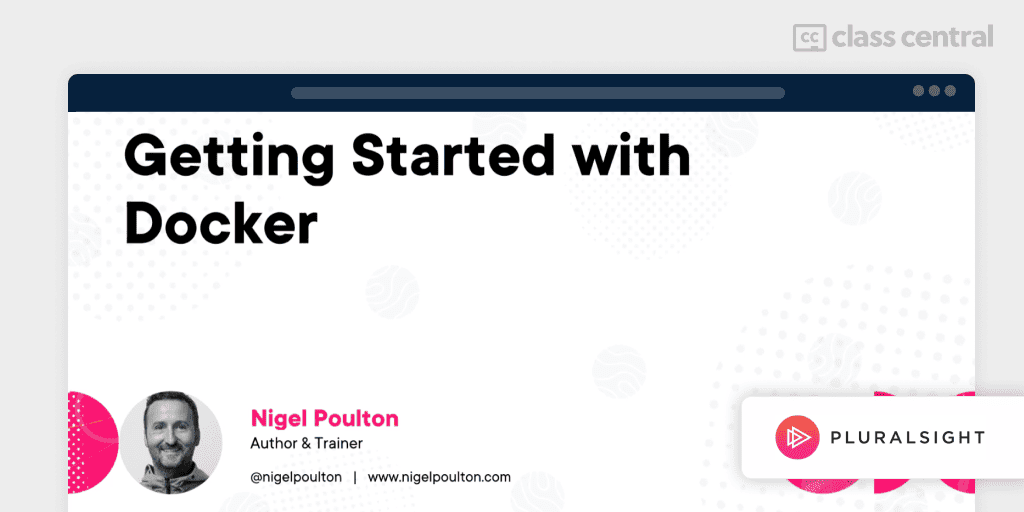
Do you need to know just enough to get started with Docker, fast? Luckily, Nigel Poulton has got you covered!
Getting Started with Docker makes it fun to learn containers and also understand why you might need them (hint: microservices). How? By taking an application all the way from source code on a GitHub repo, and then running it as a container image, sharing it in a registry, and then running it as a container — quite a journey indeed.
Along the way, you’ll get your hands on with some of the most important tools in the industry, without the jargon. Microservices? Cloud native? Declarative configurations? You’ll get all of that explained in plain English. By the end of this course, you’ll be ready to tackle Kubernetes.
This paid course was updated in May 2023, replacing the older but highly rated course. Has it left you wanting more? Check out the rest of the Docker Fundamentals for Developers learning path.
| Provider | Pluralsight |
| Instructor | Nigel Poulton |
| Level | Beginner |
| Workload | 1–2 hours |
| Rating (old course) | 4.5 / 5.0 (900) |
| Cost | Paid / Free Trial |
| Exercises | None |
| Certificate | Paid |
Best Free Comprehensive Course to Get Production-Ready for All Levels (Elton Stoneman)
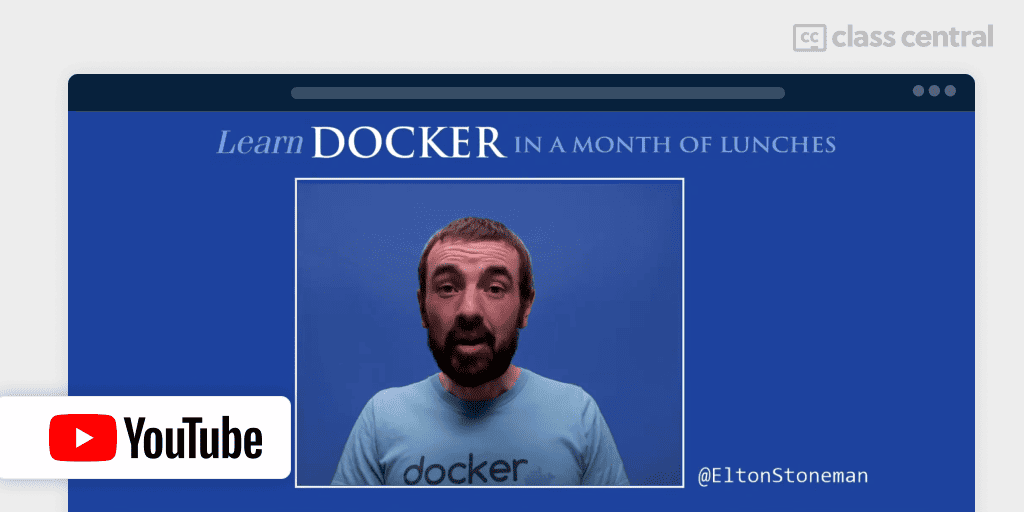
Learn Docker in a Month of Lunches aims to teach you the principles behind how everything works in Docker while also getting the best practices baked in right from the beginning, whether you’re a complete newbie or used Docker in the past.
And if you’re a complete newbie, you perhaps might not know or use Linux. No problem! You should be able to follow along on any operating system, and yes, that includes running the code samples and working on the exercises.
Though the book the course is based on is paid, there’s no need to purchase it. Elton Stoneman isn’t shy to show and reference the book in his video lessons and all the exercises and labs can be found freely on GitHub. Thus, the course is completely free to take.
As for the course structure, it is split into 4 sections. Each section will take a week to fully complete, as they are really task-focused, helping you get good at one topic before moving on to the next. And they are:
- Understanding Docker containers and images
- Running distributed applications in containers
- Running at scale with a container orchestrator
- Getting your containers ready for production
And with Elton being an amazing teacher and writer, I bet you’ll find the course to be a pleasant experience, that is if you have enough lunch breaks to spare.
| Provider | YouTube |
| Instructor | Elton Stoneman |
| Level | Beginner |
| Workload | 20–21 hours |
| Cost | Free |
| Exercises | Available |
| Certificate | None |
Best Free Workshop-Like Tutorial for Beginners (Prakhar Srivastav)
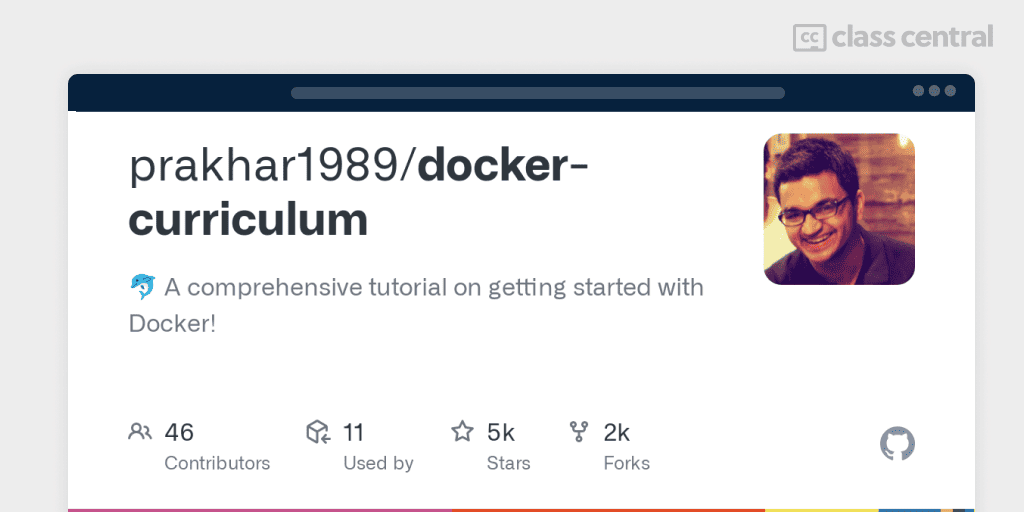
If you’d rather a more workshop-like approach to learning, I have the perfect tutorial right here, A Docker Tutorial for Beginners.
In this free text-based tutorial written by Prakhar Srivastav, you’ll get your hands dirty with Docker by building and deploying a static website and two webapps to the cloud with AWS.
You’ll learn how to set up Docker, run your own containers, play with static and dynamic websites, and most importantly get valuable experience dealing with production-grade cloud services like Elastic Beanstalk and Elastic Container Service — no experience with deployments required. Thus, you’ll come out of this course confident in your abilities to deal with servers.
| Provider | Independent |
| Instructor | Prakhar Srivastav |
| Level | Beginner |
| Workload | N/A |
| Forks | 2.1K |
| Stars | 5.2K |
| Cost | Free |
| Exercises | Available |
| Certificate | None |
Best Paid Course for Beginners (Mosh Hamedani)

If you’re a beginner to software development willing to pay for high-quality content, shall I suggest Mosh Hamedani’s The Ultimate Docker Course?
With the only requirements being 3 months of coding experience and basic familiarity with Git, this is easily one of the most accessible courses for beginners out there. And yes, that means you don’t need any knowledge of Linux commands whatsoever.
You might be wondering: Why should I pay for this course if Elton’s Learn Dockers in a Month of Lunches is also just as accessible? Good question!
Mosh has structured his course into a series of bite-sized, easy-to-follow videos. Thus, this course is much more concise, covering theory and certainly without neglecting practice. You’ll find lots of hands-on exercises to be completed.
Thus, by the end of this course, you’ll be able to:
- Understand the fundamentals of Docker and containerization technology
- Create and manage Docker containers effectively
- Build custom Docker images for different applications and services
- Utilize Docker Compose to orchestrate multi-container applications
- Implement container networking and manage inter-container communication
- Optimize Docker containers for performance and scalability
- Properly version your Docker images
- Store persistent data in volumes
- Use Docker Machine to provision Docker hosts
- Troubleshoot issues like a pro
| Provider | Independent |
| Instructor | Mosh Hamedani |
| Level | Beginner |
| Workload | 5 hours |
| Rating (of CodeWithMosh) | 4.8 / 5.0 (2.1K) |
| Cost | Paid |
| Exercises | Available |
| Certificate | Paid |
Best Paid Course for Developers (Nick Janetakis)
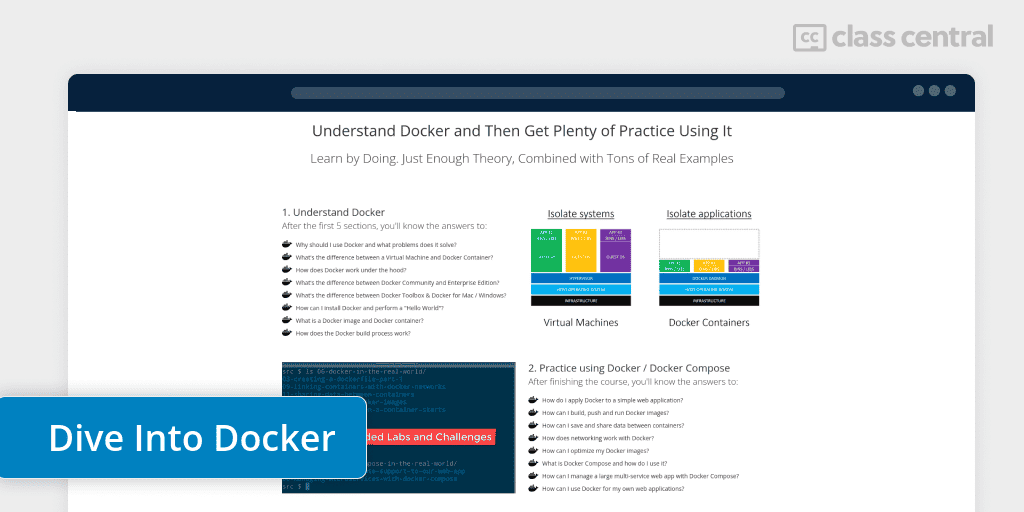
Perhaps you’ve had professional experience as a software developer or an ops manager and the last course didn’t suit your fancy. Not to worry, Nick Janetakis course is targeted towards people just like you!
Dive Into Docker calls itself the ‘The Complete Docker Course for Developers’, and that’s no exaggeration. The course is well acquainted with trials and tribulations software developers face, and thus, you’ll be able to find solutions that are not only practical but also highly efficient for your day-to-day work. Through guided labs and challenges, you’ll find that by the end of the course, you’ll be able to apply your Docker skills and knowledge (including Docker Compose) to real world applications.
You won’t only have videos and labs to complete, however. You’ll also be given starter projects and source codes for web app development, allowing you to experiment with Docker development to your heart’s content. Plus, access to Nick’s private forum if you were to have any questions after the course. So for the course’s modest price, I feel that it’s quite a steal.
| Provider | Independent |
| Instructor | Nick Janetakis |
| Level | Intermediate |
| Workload | 5 hours |
| Cost | Paid |
| Exercises | Available |
| Certificate | None |
Best Courses Guides Methodology
I built this ranking following the now tried-and-tested methodology used in previous Best Courses Guides (you can find them all here). It involves a three-step process:
- Research: I started by leveraging Class Central’s database with 150K online courses and 200K+ reviews. Then, I made a preliminary selection of 300+ Docker courses by rating, reviews, and bookmarks.
- Evaluate: I read through reviews on Class Central, Reddit, and course providers to understand what other learners thought about each course and combined it with my own experience as a learner.
- Select: Well-made courses were picked if they presented valuable and engaging content and they have to fit in a set of criteria and be ranked accordingly: comprehensive curriculum, affordability, release date, ratings and enrollments.







